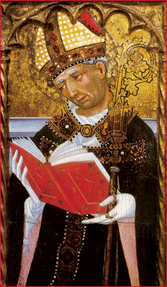
He despised his abundant wealth, sold his property, and gave the money to the poor, and left his wife Therasia, changed his country, broke all natural ties, and retired to Spain, conforming to the more precious poverty of Christ, which he valued more than the whole world. While he was devoutly assisting at Mass in Barcelona on the feast of the Lord's Nativity, he was suddenly seized by force by an admiring crowd, and in spite of his reluctance, ordained priest by the Bishop Lampidius. Then he returned to Italy, and at Nola, where he had been drawn by devotion to St. Felix, he built a monastery near his tomb, and entered upon the monastic life with some companions. This man, already notable for his senatorial and consular dignity, embraced the folly of the cross to the admiration of almost the whole world, and, clothed in a mean garment, in vigils and in fastings, remained for days and nights fixed in constant contemplation of heavenly things. But, as the fame of his sanctity spread, he was elevated to the see of Nola, and entering upon that pastoral office, he gave a wonderful example of piety, wisdom, and above all, of charity.
Meanwhile he had produced writings full of wisdom, treating of religion and faith, and often also as a recreation, he had celebrated the deeds of the Saints in numerous elegant poems, attaining the highest fame as a Christian poet. All the men living at that time who were pre-eminent for holiness and learning, he attached to himself with the bonds of friendship and admiration. Very many flocked to him from all parts of the country, as if to a master of Christian perfection. When Campania was laid waste by the Goths, he devoted all his resources to feeding the poor, and ransoming captives, without even leaving for himself the necessities of life. And after that, when the Vandals invaded the same region, a widow begged him to ransom her son who had been captured by the enemy; and as he had spent all his resources in works of piety, he sold himself into slavery in the young man's place, and was taken in chains to Africa. At length he was set at liberty, not without the evident assistance of God, and, returning to Nola, the good shepherd once more saw his beloved flock. There, in a most peaceful end, he fell asleep in the Lord in the seventy-eighth year of his age. His body was buried near the tomb of St. Felix, and later, in the time of the Lombards, was translated to Benevento and, under the Emperor Otto III, to Rome, where it was laid in the basilica of St. Bartholomew on an island in the Tiber. But Pope Pius X ordered the sacred relics of Paulinus to be restored to Nola, and he raised his feast to the rite of a double for the universal Church.




